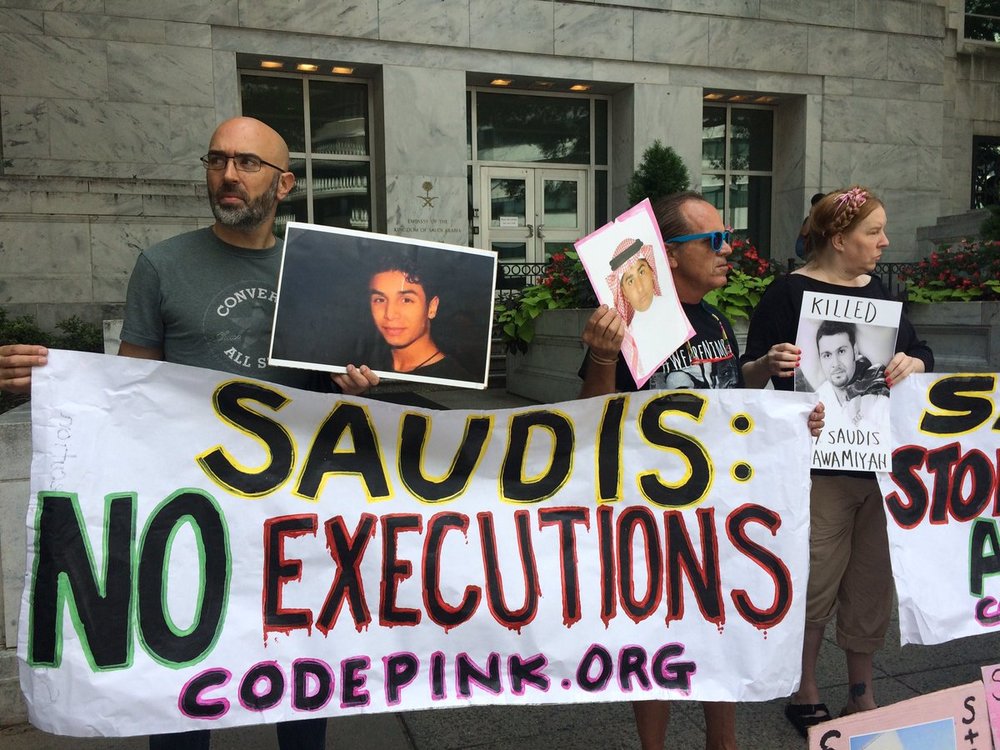By Syed Zafar Mehdi

TEHRAN - The grandiloquent talk of ‘reforms’ in Saudi Arabia had dominated the popular discourse in the West after crown prince Mohammad bin Salman (MBS) engineered an unprecedented purge of his own family late last year and seized control of the palace.
The much-hyped ‘reforms’, which only palace insiders had an inkling of, made MBS an overnight ‘darling’ in the West. That was until dissident journalist Jamal Khashoggi came into the picture and punctured the balloon of make-believe ‘reforms’.
The crown prince stands exposed today. His crown has stains of blood. His disgraceful fall from grace was inevitable but nobody would have possibly thought that it would come so soon.
In the latest report, demolishing the ‘reforms’ charade, a report by a UK-based human rights group has revealed that executions in Saudi Arabia have doubled during the crown prince’s eight months in power.
According to a report by Reprieve, there were 133 executions in Saudi Arabia between June 2017 and March 2018, compared to just 67 in eight months prior to that. Among those executed have been poor and hapless migrants forced into smuggling drugs.
Almost 150 foreign workers, mostly from South Asia, were executed in the kingdom during 2018, the report said, bringing into spotlight Saudi regime’s dismal human rights record.
Since 2014, the report said, there have been nearly 700 extra-judicial executions in the country. This year, on an average, 13 executions took place every month, which shot up to 27 executions in July.
Maya Foa, Reprieve Director, said despite promises of ‘reform’ from the crown prince, the kingdom is executing drug offenders at an alarmingly high rate, including many teenagers, without following the internationally established legal norms.
Commenting on the murder of Saudi journalist Jamal Khashoggi, Foa said the diabolical crime “exposed the brutality of Saudi Arabia’s rulers to the world”. “Now the kingdom must be held to account for its use of the death penalty, as political prisoners and vulnerable economic migrants await the executioner’s blade,” she said in a statement.
Most of the executions in Saudi Arabia have been based on flimsy grounds. In October this year, an Indonesian national was executed by the Saudi regime without informing her family or the Indonesian government.
Tuti Tursilawati was accused of killing her Saudi employer, in self-defense, after he had attempted to rape her. Her testimony was dismissed because she was a foreigner and a hapless woman.
The report further states that the prosecutions for political crimes have increased under MBS and that “at least 54 people are facing death sentences for opposing the regime, of whom 30 are at risk of imminent execution.”
One of them is Abbas al-Hassan, sentenced to death in 2016 on dubious charges of ‘treason’, including spreading the Shia faith and taking part in anti-regime protests. In an investigation, UN categorically stated that his trial did not meet “fair trial and due process guarantees,” and the charges were “in contravention of the right to freedom of religion.”
But, if the Saudi regime can make a mockery of the UN-brokered ceasefire agreement on Yemen, it can also neglect UN investigations into regime’s horrible human rights record. Ironically, Saudi Arabia sits on the UN Human Rights Council.
Another prisoner, Ali al-Nimr was framed under dubious charges of participating in pro-democracy rallies in 2012 at the age of 17, and sentenced to death by crucifixion which means beheading and public display of the body.
There have been reports recently that the regime is planning to execute four more prisoners, leading to speculation that al-Nimr may be one of them. Other names doing rounds include Dawood Hussein al-Marhoon and Abdollah Hasan al-Zaher, who was also arrested as teenagers on similar charges
In a statement July last year, following the execution of four Shiite men in country’s eastern province, Amnesty International said the Saudi regime was employing the death penalty as a “political weapon to silence dissent”.
The watchdog said it has documented the cases of at least 34 other Shi’a men currently on death row, including al-Nimr, al-Marhoon, and al-Zaher.
Nimr’s planned execution, according to Foa, is “based apparently on the authorities’ dislike for his uncle, and his involvement in anti-government protests would violate international law and the most basic standards of decency. It must be stopped.”
Al-Nimr’s uncle and noted Shia scholar Baqir al-Nimr was executed by the Saudi authorities in January 2016. The senior Nimr, who commanded a huge following among Saudi Arabia’s Shiites, demanded freedom of belief for the Shiites in kingdom.
He was slapped with charges of sedition and imprisoned. In prison, he was ruthlessly tortured, forcing him to go on hunger strike. Finally, he was executed with 46 others, sparking worldwide protests.
That was the time before MBS came into limelight and promised ‘reforms’. But, during his time, the situation has only become grimmer. He has surpassed his predecessors to ruthlessly crush dissent at home and carry out deadly attacks in other countries – most notably Yemen.

No comments:
Post a Comment